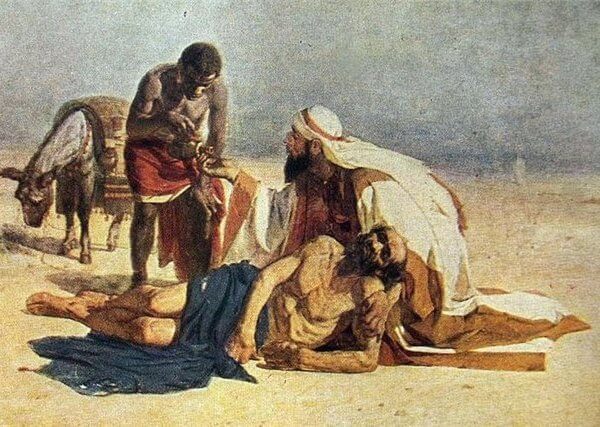
Modern Midrash
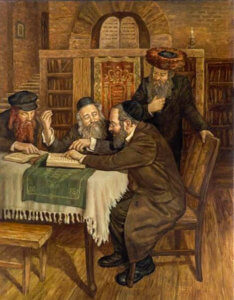 We were talking about midrash the other night at dinner. Midrash is the ancient Jewish rabbinic tradition of interpreting biblical texts. Through conversation and scholarly debate, rabbis — who were teachers of scripture and the law — entered into spoken and written dialogue, to study, question, and reconcile in their understanding different parts of scripture. This holy conversation took place both in real time and across generations and centuries, focusing especially on parts of scripture that were confusing, or otherwise seemed to contradict or conflict with each other. In time midrash developed into a sophisticated interpretive system that reconciled apparent biblical contradictions, established the scriptural basis of new laws, and enriched biblical content with new meaning. This tradition of close engagement with the text can open new insights and deepen our understanding of scripture.
We were talking about midrash the other night at dinner. Midrash is the ancient Jewish rabbinic tradition of interpreting biblical texts. Through conversation and scholarly debate, rabbis — who were teachers of scripture and the law — entered into spoken and written dialogue, to study, question, and reconcile in their understanding different parts of scripture. This holy conversation took place both in real time and across generations and centuries, focusing especially on parts of scripture that were confusing, or otherwise seemed to contradict or conflict with each other. In time midrash developed into a sophisticated interpretive system that reconciled apparent biblical contradictions, established the scriptural basis of new laws, and enriched biblical content with new meaning. This tradition of close engagement with the text can open new insights and deepen our understanding of scripture.
There is not an exact parallel to the midrashic tradition in Christianity, although there are many early gospels that didn’t make it into our canon of Paul’s and other apostles’ letters, or Matthew, Mark, Luke, and John’s gospels. These non-canonical gospels — attributed to James, Thomas, Mary Magdalene, and even Judas, among others — didn’t meet important criteria to be included in the canon. For example, the proto-gospel of James was written in the 4th century, at least two hundred years after the resurrection. The proto-gospels raise interesting questions, and hash out important points and details that help us to fill in fuzzy details, and understand what’s at stake.
Parable of the Persistent and Meticulous Lawyer
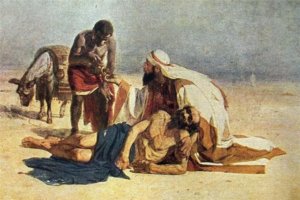 This brings us to today’s gospel, the parable of the Good Samaritan, or, as I like to call it, the Parable of the Persistent and Meticulous Lawyer. Now, I want to say a few words in defense of the lawyer here — not only because lawyers get a bad rap, or because I am one, although clearly those are fair points too. I want to focus on Jesus’ conversation with the lawyer because I really think that their dialogue has a very important midrashic function that reveals new understandings. In the New Revised Standard translation of Luke’s gospel that we read, the lawyer addresses Jesus as Teacher. In other translations, the lawyer addresses Jesus as Rabbi, calling our attention to this important conversation’s foundation in midrash.
This brings us to today’s gospel, the parable of the Good Samaritan, or, as I like to call it, the Parable of the Persistent and Meticulous Lawyer. Now, I want to say a few words in defense of the lawyer here — not only because lawyers get a bad rap, or because I am one, although clearly those are fair points too. I want to focus on Jesus’ conversation with the lawyer because I really think that their dialogue has a very important midrashic function that reveals new understandings. In the New Revised Standard translation of Luke’s gospel that we read, the lawyer addresses Jesus as Teacher. In other translations, the lawyer addresses Jesus as Rabbi, calling our attention to this important conversation’s foundation in midrash.
Scholars tell us that midrash first came into written form in the first century BCE, with many writings between the fifth and 13th centuries of the Common Era. Given Jesus’ role as a rabbi, or teacher, and his deep grounding in the Torah as a good, observant Jew, this conversation with the lawyer fleshes out the meaning of neighbor, honoring and upholding the letter of Jewish law, while reminding the lawyer, and all of us listening in, that the spirit of the law is grounded in mercy. Luke’s gospel does say that the lawyer was testing Jesus, and that the lawyer wanted to justify himself, which are two whole strikes against the lawyer in the public opinion polls.
But the human personality is complex, and our own motivations can often be mixed, mysterious, or sometimes even hidden from us and more visible to others. All that being said, the lawyer is doing something really useful here — even helpful. Is it really possible that no one else in the gathered crowd wondered exactly what the lawyer asked Jesus? Remember that even Jesus’ own disciples make mistakes. Jesus often asks his disciples why they don’t see, why they can’t remember, and when they will finally understand. For us, these dialogues of misunderstanding slow down the narrative so that we can do two things at once: We can understand what Jesus is trying to say as he explains it again, and we can be grateful that none of us was the one who asked the question or made the mistake. Even Peter, the rock on whom Jesus founded his church, is rebuked by Jesus for misunderstanding all the time. Not in Luke, but in Matthew’s and Mark’s gospels, Jesus even calls Peter Satan as he calls Peter out for tempting him with temporal power. Build houses for Jesus, Moses, and Elijah at the Transfiguration? Whew! Glad I didn’t suggest that!
The lawyer here, even though he has complicated, mixed motives — in that complicated, mixed way human beings have — is bringing some things out into the open that certainly some people in the crowd were eager to hear but afraid to ask. Without the lawyer’s question, or a question from some person in the crowd who, for whatever motivation, was courageous — or dumb, or privileged, or self-important — enough to ask, we would not have this parable. The lawyer actually serves a purpose here, as a foil in Jesus’ conversation. It’s easy to see, once he engages Jesus in dialogue, what one must do to have everlasting life.
We learn, through the lawyer’s question, for example, that a man was going down from Jerusalem to Jericho when he was robbed, beaten, and left for dead. The priest and the Levite were also going down from Jerusalem — which means that they were traveling in the same direction as the victim. The Samaritan, however, is merely traveling around. We don’t know where he began his route, or in which direction he’s going. In any case, it’s reasonable to understand from social history that he wouldn’t have had business, or found acceptance, in Jerusalem. In fact, that’s surely why he’s in the story to begin with.
What is important, as Jesus explains in response to the lawyer’s question, is that WHEN the Samaritan saw the victim of the attack, he was moved with pity, while when the priest and the Levite saw the victim, they moved to the other side of the road. Because all three of the victim, the priest, and the Levite were going down from Jerusalem, they were likely all three members of the same broad social group. They were the in-crowd, with business in Jerusalem. But the Samaritan was an outsider, on the margins, who wouldn’t have been accepted or liked by them. Yet he was moved by compassion to help the victim, while the priest and the Levite moved themselves to the other side of the road — far enough away so that they could not even accurately detect whether or not the victim was dead. Fears of ritual impurity could possibly outweigh their duty to their neighbor, which was a thing for Jews, although Jesus was helping them redefine that here. Even though the lawyer may have had complicated, mixed motives, like human beings do, he has drawn out something really useful that maybe everyone else wished they knew and were afraid to be rebuked or embarrassed — or hadn’t thought to ask.
Hypo
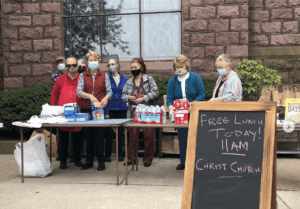 So after listening in on Jesus’ and the lawyer’s midrash, let’s work through what in law school we call a hypothetical question — a hypo, for short: General Convention is going on in Baltimore right now, and I read in the Episcopal News Service yesterday that Christ Episcopal Church in the Diocese of Pennsylvania has been cited for violating its town’s zoning code, with local officials claiming the church’s ministries to locals in need mean it no longer fits the definition of “church” in the town’s zoning ordinance. Christ Church must stop the ministries by July 10 or face fines of $500 a day plus court costs. Here’s what they’re doing at Christ Church: once a week, the parish serves a free community meal and operates an essentials pantry, offering household basics and toiletries for free. According to the citation, that means Christ Church is no longer classified as a church, and thus does not meet the zoning criteria for the downtown district.
So after listening in on Jesus’ and the lawyer’s midrash, let’s work through what in law school we call a hypothetical question — a hypo, for short: General Convention is going on in Baltimore right now, and I read in the Episcopal News Service yesterday that Christ Episcopal Church in the Diocese of Pennsylvania has been cited for violating its town’s zoning code, with local officials claiming the church’s ministries to locals in need mean it no longer fits the definition of “church” in the town’s zoning ordinance. Christ Church must stop the ministries by July 10 or face fines of $500 a day plus court costs. Here’s what they’re doing at Christ Church: once a week, the parish serves a free community meal and operates an essentials pantry, offering household basics and toiletries for free. According to the citation, that means Christ Church is no longer classified as a church, and thus does not meet the zoning criteria for the downtown district.
Remember our haloes — our ribbons on the fence, and what we wrote on them about our best intentions for each other and our community? Remember how we can hide our haloes from each other and even from ourselves sometimes, because human personality is complicated? What does it look like when we love God with all our mind, with all our heart, and with all our strength, and to love our neighbor as ourselves? What is a church?
Bishop of Pennsylvania Daniel Gutiérrez — also the Compass Rose Society President — wrote in a statement to Episcopal News Service, This is the very definition of our faith — to embody Jesus and serve all people, especially the poor. Are the weekly services to the poor at Christ Church different from the activities of a church?
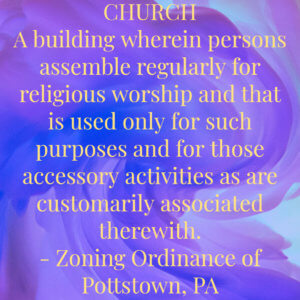 If a zoning citation has already been written, the difference in understanding between the church and the town has been going on for a while. Before we form an opinion, do we know everything we need to know to understand the whole story?
If a zoning citation has already been written, the difference in understanding between the church and the town has been going on for a while. Before we form an opinion, do we know everything we need to know to understand the whole story?
Have the wardens talked with representatives from the city? Are the wardens or the clergy aware of any neighbors’ concerns about safety in crowds, or, for example, with litter or smoking? Are there lines or crowds coming to the weekly community meal that cause traffic disruptions or danger? Has the church been a good neighbor to those who live close by and are concerned by listening to their concerns?
How could midrash expand our understanding?
What would you say to the wardens? To the community service program volunteers? To the program guests and clients? To the zoning board? To all the neighbors? Amen
